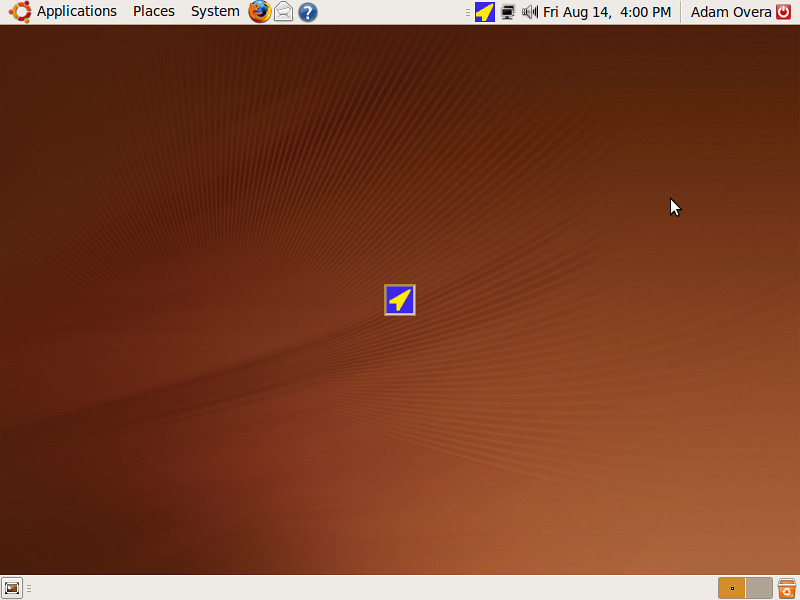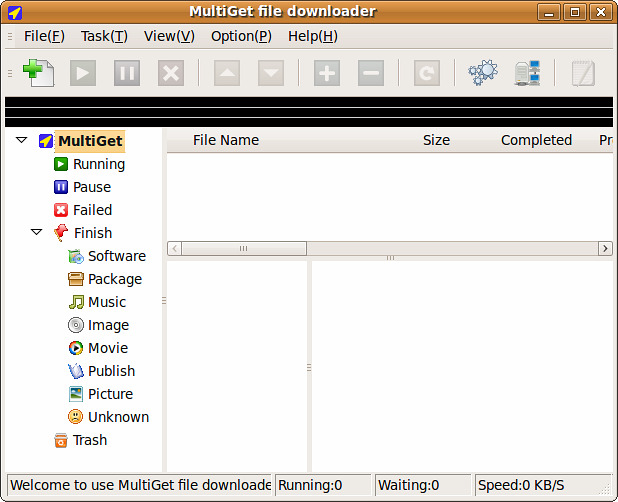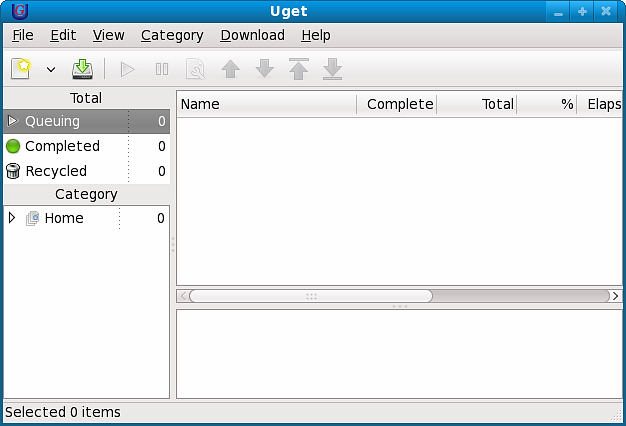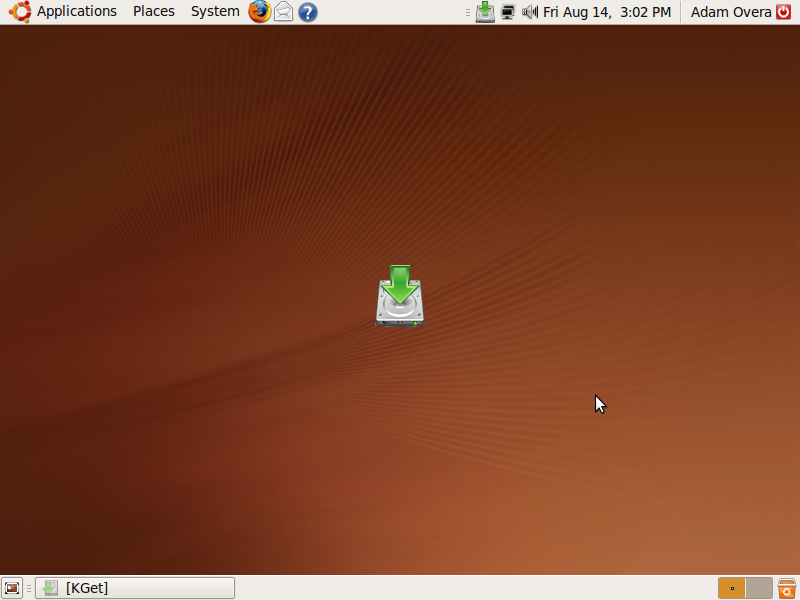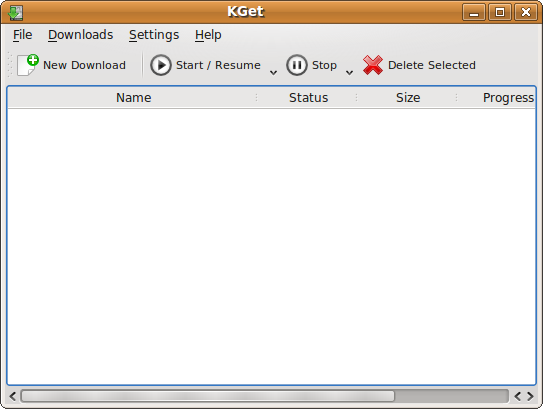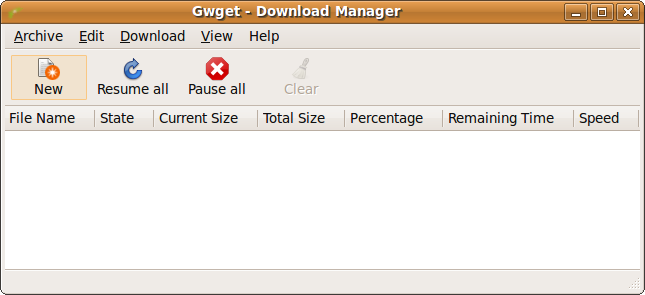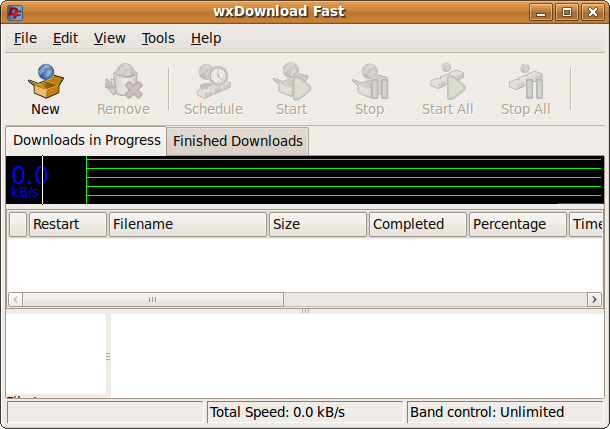Tom's Definitive Linux Software Roundup: Internet Apps
Download Managers
Download managers are one type of app that came into existence in order to fix a specific problem. As the size of files being sent over the Internet overtook average bandwidth, the need to pause, resume, and recover downloads became very important. Wasting several days of downloading a monolithic Linux distro or game demo because your OS/browser crashed or ISP went down, quite frankly, sucked.
Download managers are now largely useless; most browsers have most of their key features built-in. However, if you still have low-speed Internet access or simply don't trust your browser not to crash, download managers still fulfill the same needs. I used the official direct download link for Linux Mint 7, an up-and-coming distro based on Ubuntu, as my test file.
MultiGet (v. 1.2.0)
MultiGet has a very clean and simple interface, yet is robust enough for even heavy downloaders. It handles regular HTTP and FTP perfectly, but has no support for BitTorrent. MultiGet has a drop icon that works flawlessly, like KGet.
Unlike KGet, MultiGet does not open files using KDE default apps, mainly because it does not have the option to open any files. It's left-hand sidebar divides downloads into software, package, music, image, movie, publish, picture, and unknown categories, which makes sorting through completed downloads a breeze.
Uget (v. 1.4.9.1)
Uget is probably the easiest and most stable lightweight download manager available. I had no crashes or buggy behavior (the same goes for wxDFast and GWget).
Get Tom's Hardware's best news and in-depth reviews, straight to your inbox.
While you cannot drag and drop links into this app, simply doing a right-click Copy Link Location within your browser will automatically input the link into Uget's new download address box from your clipboard, without pasting. The only error that I experienced was when pausing the last/only active download, at which point the 'all downloads complete' popup notification appeared, along with an irritating event sound. It's too bad that this app isn't available in more repos or as a deb or rpm package.
Kget (v. 2.2.2)
KGet is the native KDE download manager. This app handles regular HTTP direct downloads, as well as FTP and BitTorrent.
The first thing that you are sure to notice is the floating KGet icon that appears in the middle of your screen.
Simply drag a link from your Web browser to the floating icon in order to begin downloading a file. This will work for any link, be it a regular download, jpeg, pdf, Web page, FTP download, or BitTorrent file. Don't worry; you can move the icon anywhere on the desktop that you wish. If that's not enough, you do have the option to remove the icon and input downloads into Kget by simply pasting URLs into the new download function.
Like all download managers, Kget gives you the ability to pause and resume downloading. One issue I had with Kget was that it used KDE default apps instead of my own defaults. For instance, when you open the destination folder of a downloaded file, KGet uses Dolphin (the new KDE file manager) instead of Ubuntu's Nautilus. When opening a saved Web page, KGet opens Konqueror (KDE's default browser), instead of my default, Firefox. As usual with KDE apps, KGet is going to be much more attractive if you are using KDE as your GUI.
Downloader for X (v. 2.5.7.1)
Downloader for X is a great little download manager for HTTP and FTP. As with any download manager, Downloader for X can pause and resume transfers. You can drag and drop links into the app's main window, along with the obligatory URL paste, to begin transferring files. This app also allows you to create and manage different sets of queues, which is ideal for those of us who download massive quantities of files. My only issue with Downloader for X is a minor one: horrendous Final Fantasy fanfare-like “music” plays when you open the app. You can easily turn sound events off with a single check box in the Options/general menu.
GWget Dowload Manager (v. 1.0.1)
GWget is simple. This app has the most standard features that you would expect from a download manager: pause/resume, and that's about it.
You must manually type or paste a file's URL into this app. Dragging a link from your browser into GWget causes one of the worst crashes that I've seen on a Linux system in many years. It will lock GWget, your browser, and slow your system to a slideshow for several minutes (longer if you don't hit force-quit quickly, as it will lock your panel buttons too).
Fortunately, it recovers from crashes just fine. But you'll have to restart your downloads from scratch, including remembering to save the files in the same place as before. If you're not in the habit of dragging links into your download manager, GWget gets the job done. Otherwise, avoid it.
WXDownloadFast (v. 0.6.0)
WXDownloadFast, or wxDFast, is a simple and easy-to-use download manager. It handles HTTP and FTP downloads, but unfortunately not BitTorrent. Like many of the download managers featured here, wxDFast will auto-populate the target URL from your clipboard. This app crashes a lot. Resuming and sometimes even stopping a download can cause wxDFast to close. Also, the scheduling feature seems to lock a download into an unchangeable state of 'paused' until you restart the app.
-
tacoslave my web machine runs on linux and i find the experience to be quite satisfying but i still game on windows.Reply -
C 64 tacoslavemy web machine runs on linux and i find the experience to be quite satisfying but i still game on windows.I run Linux on my old notebook and the experience is more than just satisfying. In fact most of the office work I do on that notebook is now done in linux an Win are used only to play. If linux only got some more games...Reply -
charlesxuma allow me to say this in a simple minded manner ...Reply
for the dumb there is OS X
for the weak there is windows
for the rest there is LINUX
If u find my statement offensive, then DO something about it dont just sit there winning about it. (LEARN) Remember we were all DUMB ONCE.
p.s : GAMERS NOT INCLUDED :) -
Hellbound CharlesXumaallow me to say this in a simple minded manner ... for the dumb there is OS Xfor the weak there is windows for the rest there is LINUXIf u find my statement offensive, then DO something about it dont just sit there winning about it. (LEARN) Remember we were all DUMB ONCE.p.s : GAMERS NOT INCLUDEDReply
ding fries are done....
-
For FTP you can also simply use nautilus, the file manager. Just click file->connect to server (or in the menu bar places->connect to server)Reply
-
cybrcatter CharlesXuma:Reply
You truly covered all of you bases in that post.
I was hoping that with the recession, perhaps companies who were really trying to make more efficient use of their capital would start to look at Linux as a tempting prospect.
I wounder if there are any intriguing statistics about this. -
mitch074 I'm a Linux user. I'm not a big gamer.Reply
Still, that Nexuiz thingie gives my RadeonHD 4850 a workout. Chromium B.S.U. might be old but it's nice looking and addictive. And TORCS is not for the faint of heart. And...
Well, if you go and dig into the results of 'linux games' in Google, you can find nice stuff. -
cryogenic ReplyIn order to test drive the feature sets of these applications, and to determine 64-bit friendliness, I used a native (non-VM) and fully-updated installation of 64-bit Ubuntu 9.04. When an application was not available for the 64-bit architecture, I used the 32-bit VM installation of Ubuntu. If that failed I would use Kubuntu, then Fedora, and then openSUSE
Fail!
You had to use ~5 different versions of Linux to install your apps?
-
charlesxuma u actually can run most of your games through wine, however if ur a hardcore gamer that installs and plays many (as in 20+) new games, wine still needs development for these kinds of users, your better off having windows os on the side, for that task in particular.Reply
There is an exception, but it will cost you a monthly fee, that hooks wine on to a software that updates installation and compatibility on a regular basis.(for the ones who can't configure wine themselves.)

